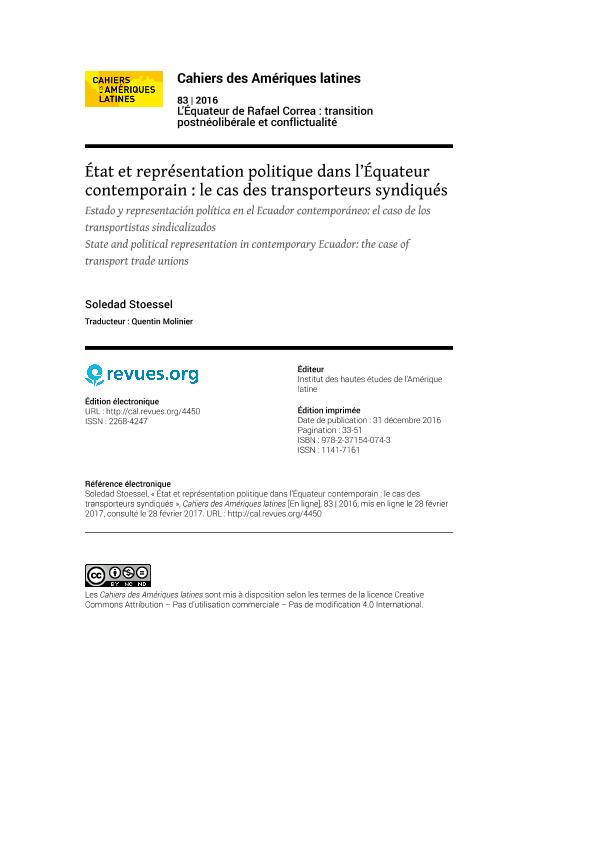Artículo
L’article analyse les liens établis entre le gouvernement de Rafael Correa et les syndicats de transports au cours de deux premiers mandats du président équatorien (2007-2013). On s’intéresse particulièrement à la façon dont le gouvernement habilite la représentation de tels syndicats au sein de l’État. Une telle problématique fait naître deux thèses envisagées par la littérature spécialisée à l’heure de caractériser la révolution citoyenne. La première définit le gouvernement comme populiste et ignore ainsi l’ensemble des médiations sociopolitiques érigées entre le pouvoir politique et divers intérêts sociaux ; la seconde identifie la révolution citoyenne comme « anticorporatiste » sans prendre en compte l’ouverture des différents espaces et logiques de représentation et les arènes de négociation socio-étatique. Le cas des syndicats de transports révèle que la logique de représentation activée par le gouvernement ne répond pas seulement à la volonté présidentielle mais aussi aux « sélectivités » au cœur de l’État et aux pressions exercées « par le bas ». Este trabajo analiza los nexos establecidos entre el Gobierno ecuatoriano de Rafael Correa y el sector del transporte sindicalizado durante sus dos primeros períodos (2007-2013). Se presta particular atención a las formas en que el Gobierno habilita la representación de los transportistas en el Estado. Semejante cuestión tensiona dos tesis propuestas por la literatura especializada para caracterizar la Revolución Ciudadana: aquella que al definir el Gobierno como « populista » ignora el conjunto de mediaciones sociopolíticas establecidas entre diversos intereses sociales y el poder político; y aquella que identifica al Gobierno como « anticorporativo » sin observar las distintas lógicas y espacios de representación abiertos en estos años según específicas arenas de negociación socio-estatal. El caso de los transportistas revela que las lógicas de representación activadas por el gobierno no responden solo a la voluntad presidencial sino también a las selectividades y rasgos inscritos en el Estado así como a la presión sindical ejercida « desde abajo ». This paper studies the relationship between Rafael Correa´s government and the unionized carriers in Ecuador during 2007-2013. It gives special attention to the ways in which the government enables the political representation of the unionized carriers within the State. Such an issue questions two thesis that have been proposed by specialised literature when characterizing the Citizenship Revolution: that defining Correa’s government as populist ignores the diverse social and political mediations that have been established between the social interests and the political power; and a second one that identifies the government as “anticorporation” failing to observe the different logics and spaces of representation which have been activated according to specific social and state negotiating fields. The case of the trade unions of transport reveals that the logics of representation enabled by the government are not only a result of presidential will but also of the “selectivities” at the center of the State and of the pressure exerted “from the bottom”.
État et représentation politique dans l'Équateur contemporain: le cas des transporteurs syndiqués
Título:
Estado y representación política en el Ecuador contemporáneo: el caso de los transportistas sindicalizados;
State and political representation in contemporary Ecuador: the case of transport trade unions
State and political representation in contemporary Ecuador: the case of transport trade unions
Fecha de publicación:
12/2016
Editorial:
Université Paris 3. Institut des Hautes études de l'Amérique Latine
Revista:
Cahiers des Ameriques Latines
ISSN:
1141-7161
e-ISSN:
2268-4247
ISBN:
978-2-37154-074-3
Idioma:
Frances
Tipo de recurso:
Artículo publicado
Clasificación temática:
Resumen
Palabras clave:
Transporte Sindicalizado
,
Estado
,
Representación Política
Archivos asociados
Licencia
Identificadores
Colecciones
Articulos(IDIHCS)
Articulos de INST.DE INVEST.EN HUMANIDADES Y CS SOCIALES
Articulos de INST.DE INVEST.EN HUMANIDADES Y CS SOCIALES
Citación
Stoessel, Soledad; État et représentation politique dans l'Équateur contemporain: le cas des transporteurs syndiqués; Université Paris 3. Institut des Hautes études de l'Amérique Latine; Cahiers des Ameriques Latines; 2016; 83; 12-2016; 33-51
Compartir
Altmétricas




